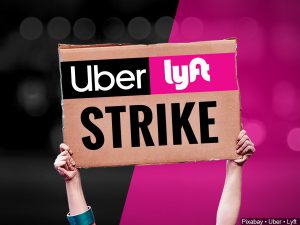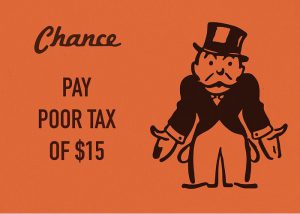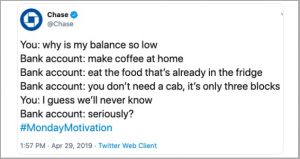From Hannah: According to a new Bankrate Survey, just over a quarter of Americans will not being going on summer vacation this year (while twenty-two percent are on the fence). Sixty percent of those respondents are forgoing vacation because they can’t afford it. Those who are going on vacation are spending an average of $1,979 to do so. Bernie Sanders sees this as a symptom of a larger problem, citing an article about this survey via Facebook to make a point: “The economic reality of our time is that over the past 40 years, there has been an enormous transfer of income and wealth from the middle class to the wealthiest people in America. And as result nearly 8 in 10 workers live paycheck to paycheck, and over 1 in 4 Americans won’t be able to take a vacation this summer. We must guarantee a living wage for all workers, make it easier to join unions and rebuild America’s middle class.”

We see a lot of examples of workers struggling for a living wage in the news everyday: the Lyft and Uber Strike, health care workers in Connecticut threatening to strike, teachers across America dealing with poor conditions and wages (and even when they do receive raises it isn’t enough — I’m looking at you Mississippi), etc. In academia, non-tenured instructors and graduate students have formed unions, including one at my home institution at Duke to fight for living wages. For many reasons besides the corporate greed Sanders cites, including globalization and automation, we are in a precarious labor market.
But if so many workers live paycheck to paycheck, why is there so much “poverty shaming” in our culture?
Take for example, the recent outrage caused by Chase Bank. The (now deleted) #MondayMotivation post read:
You: why is my balance so low
Bank account: make coffee at home
Bank account: eat the food that’s already in the fridge
Bank account: you don’t need a cab, it’s only three blocks
You: I guess we’ll never know
Bank account: seriously?
#MondayMotivation
Critics such as Elizabeth Warren responded on Twitter to point out the hypocrisy of a bank that helped caused the financial crisis and needing a bailout lecturing its customers on financial responsibility. Chase’s post falls into a cliche bit of financial advice that assumes we all have enough money to pay for necessities and then some. Popular financial “gurus” such as Dave Ramsey give out truisms such as this gem:
If you listen to his show enough, you’ll see that Ramsey really loves to valorize the rich, so this is nothing new for him. This isn’t just Ramsey: how many books are there that will tell you how to follow the patterns of millionaires and you can be one too? Part of the myth of Donald Trump is that he runs “successful” businesses and can translate that to America. Howard Schultz, while no longer super actively running for president at the moment, basically got news coverage because of his wealth. “Rich people stuff,” as we all know, includes taking advantage of workers (sometimes not paying them), paying hush money, participating in other double-dealing behavior. Yet we forgive them and give them celebrity personalities (see a different kind of rich family, the royal family, which emphasizes that many “rich people” inherited their wealth).
A lot of people don’t see anything wrong with Chase’s advice and listen to Ramsey and people like him. And what I want to talk about this episode is how, in doing so, we make a lot of assumptions. Why do we constantly look at “personal responsibility” as the answer to solving financial problems? Why are we so interested in protecting the reputations of billionaires and millionaires who are responsible for the systemic problems their workers face? What does it mean to “poverty shame” and how do we keep doing it?
From Mav: This is a topic near and dear to my heart. For one thing, I grew up poor. For another thing, this is straight up cultural studies in the purest and best possible way. Also… I just hate when people make claims like this. Like Hannah, I see a major problem that this has become so prevalent.
Part of this, I’m sure is your standard misinformation that comes from internet bubbles. People don’t like to think, so it’s nice to just see a post that reconfirms their preconceived biases. But I think it’s important to talk about where those biases come from in the first place. Why do people WANT to punch down at the poor?
There are a few other specific aspects of this that I want to definitely hit on. The two that come to mind are the push to drug test welfare recipients… something that is insanely stupid… and a waste of money. Another is the argument against student loan forgiveness that it’s “unfair to people who have worked to pay them off.” This is also insanely stupid. And then there’s the complaint that “people on food stamps shouldn’t be allowed to buy steak or cellphones or whatever.” Or actual rich people with good insurance hating Obamacare.
Part of it is a class and culture thing, I think. Sadly, one of the ways that a class knows that it isn’t at the bottom is being able to clearly see someone below them. Punching down, in a lot of ways, is a way to insure that you don’t fall any farther on the relative socio-economic ladder. Why drug test the poor? Because you get drug tested at your job and poor people shouldn’t be allowed to have more fun? Does forgiving the student loans of others somehow affect your wealth? Not really… it’s just wanting other people to suffer because you had to. And the steak, cellphone and insurance things… you’re just being an asshole.
So I’m curious as to what other things like this you can think of and why do you think they exist. Give us your thoughts so we can talk about them on the next show.







Dave Ramsey offers great advice for getting out of debt and I am a huge proponent of his 1st four baby steps. I disagree with the suggestions on investing but over all, the ideas are spot on. He’s a bit too preachy and douchey for me to say I’m a fan. I’m more for Chris Hogan who is just as honest, a bit salesman like, but gentler on the ears.
Chase Bank’s tweet, the substance, is a good idea. However. F Chase Bank in the face. I believe one should take personal responsibility and accountability for their situation. Even the stuff that was out of their control, own it and come up with a plan.
There needs to be a reshaping of financial literacy in this country. I personally think it needs to be done by those that have been or lived at various points on the social class structure. Empathy for a situation is great. Experience and the ability to speak/teach from it is even better.
It’s the myth of capitalism. That anyone can acheive success if they are willing to work hard enough and/or have natural talent. So, anyone who is poor must be that way because they are lazy or stupid. To admit otherwise would mean having to accept that their success lies, at least in part, to circumstances and was not soley reliant on their own superiority.